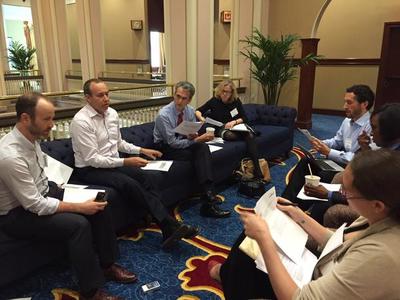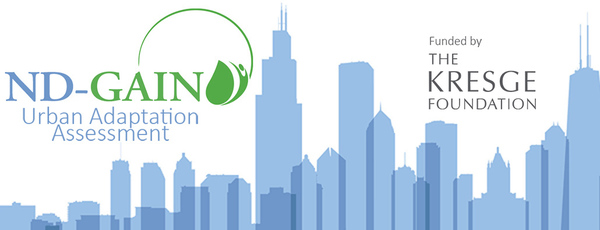
Prolonged drought, excessive heat, extreme weather… these are just a few of the hazards facing the global community in response to climate change. The ND-GAIN Country Indexprovides a means to view a country's vulnerability and their readiness to successfully implement adaptation solutions. However, climate change is and will continue to also be felt on the local level, necessitating granular, context-specific assessments in order to direct adaptation investments and actions.
Responding to this need, the Urban Adaptation Assessment project, funded by the Kresge Foundation and lead by ND-GAIN, began in early 2015 to produce an urban adaptation measurement solution and pilot it in five U.S. urban areas. These local-scale assessments will be used by government, non-profit and business leaders, who can apply them to inform market and policy positions that improve livelihoods and save lives.
As a state of the art undertaking, ND-GAIN has called upon a group of leading U.S. adaptation influencers to form an advisory committee. Working from the current urban adaptation and resilience literature, ND-GAIN created a survey seeking advisor input on the assessment’s proposed analytical framework, its component definitions, indicators, and pilot areas (these resources and others are available on the Collaboratory).
The ND-GAIN team analyzed survey results and identified areas of disagreement to generate four "challenge questions" relating to balancing the number of indicators for a robust assessment with the right indicators to capture urban nuance, the advantage of quantifying an urban area’s adaptation plan, including indicators that capture social equity, and defining what it means for an area to be ready to adapt. This work culminated in an all day meeting on May 11 in St. Louis.
While begging more questions than answering them, the in-person meeting did show the advisors’ commitment and enthusiasm for this project along with their curiosity regarding the topic’s complexity. Major outcomes of advisor expertise included the following proposed UAA framework additions/augmentations: Include the quantification of adaptation plans as a second step to the assessment Utilize a baseline analysis to evaluate progress and allow comparison among areas Choose lives and livelihoods as the focal point of a hazard-based approach.
In addition, ND-GAIN team members and advisors continue to chew on the concept of readiness to adapt. Though the term is intellectually dividing, it is a necessary component that requires inclusion in the adaptation assessment. The pilot assessment is scheduled for completion in summer of 2016.
